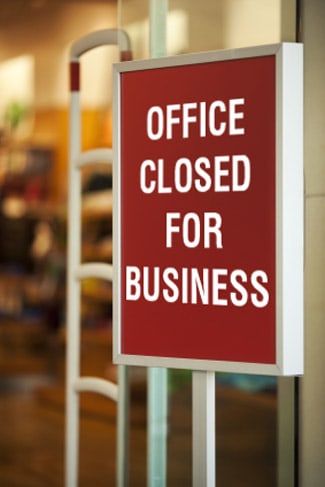What happens if your insurance company is in financial trouble?
You didn’t see it coming, but your insurance company is in financial hot water.
Chances are, you learned about it in a letter from your state insurance regulator: Your insurer has been shut down and may be sold. Your first reaction is understandable: What happens to my policy? That’s an especially important question if you’ve got a pending claim.
The truth is, there’s good and bad news for consumers when an insurer runs into severe financial trouble. First, the bad news: Your insurance company is tanking. Now, the good news: States have safety nets in place to protect you.
“There’s really not much consumers can do on their own,” says Glenn Stevick, an assistant professor of insurance at The American College in Bryn Mawr, Pa.
“While the state works it out, all the consumer can really do is keep making their policy payments,” Stevick says. “If you stop making your payments, you’ll stand to lose your coverage.”
In the meantime, your state insurance regulator is trying to help you. In large part, that means seeing whether the insurer has enough cash to pay outstanding claims. If not, the state either places the insurance company into receivership — a court process similar to bankruptcy — or arranges for another insurer to buy the assets of the financially troubled company. Each state has a system that covers policyholders’ claims (up to a certain point) for an insurer that’s gone belly up.
A troubled company in Florida
In March 2011, the Florida Office of Insurance Regulation stepped in after discovering Seminole Casualty Insurance Co. was insolvent. Seminole’s financial obligations exceeded its assets by nearly $5.8 million in 2010. State regulators yanked Seminole’s authority to do business in Florida, and Seminole agreed to have the company put into receivership.

Seminole can regain its Florida insurance license if comes up with enough money to shore up the company. Otherwise, state regulators will look at selling the company’s assets.
In Florida, Seminole has more than 33,000 personal auto policyholders, nearly 1,700 commercial auto policyholders and nearly 2,500 contractors’ general liability policyholders. Those policyholders’ claims are protected — sometimes in part, sometimes in full — by the Florida Insurance Guaranty Association.
“The potential failure of insurance companies, like the potential failure of all businesses, is an unfortunate, but inevitable, part of doing business in a free-market system,” the Florida Insurance Guaranty Association says.
State funds cover outstanding claims
Florida and every other state operates a property and casualty guaranty fund — sort of like an emergency savings account — that pays outstanding claims filed with insolvent insurance companies. This system, designed primarily for auto insurance and home insurance companies, “has safeguarded countless policyholders who might otherwise face financial ruin because of unpaid claims,” according to the National Conference of Insurance Guaranty Funds.
Guaranty funds generally pay the amount of coverage stipulated by the policy or $300,000, whichever is less, according to the National Conference of Insurance Guaranty Funds. These caps are set by state law.
Separate state guaranty associations cover claims filed with life and health insurance companies, according to the National Organization of Life & Health Insurance Guaranty Associations.
While state laws governing maximum limits and types of life insurance and health insurance policies covered vary, according to the National Organization of Life & Health Insurance Guaranty Associations, most states offer at least:
• $300,000 in life insurance death benefits.
• $100,000 in cash value for life insurance.
• $100,000 in cash value for annuities.
• $100,000 in health insurance policy benefits.
Some states go beyond those limits. Oregon, for example, bumped up its annuity payout limits from $100,000 to $250,000 in the event of an insurer’s collapse.
“The Oregon life insurance industry has been strong, but during rough economic times, insolvency is a possibility,” says Cory Streisinger, director of the Oregon Department of Consumer and Business Services. “Many Oregonians buy annuities to fund their retirement. This new law ensures that investment is protected.”
Guaranty funds and associations get their money from an assessment an insurer pays on the amount of premiums it collects in each state.
It’s important to note that guaranty funds and associations do not sell insurance. They cover only claims and do not issue replacement policies. A policyholder affected by a insurer’s failure must buy new coverage on his own.
Claims payments may take awhile
Stevick advises consumers against cashing out a policy or taking out a loan against it if an insurer goes under.
“Claims usually are paid out pretty quickly, but there could be severe restrictions if you try to cash out or get a loan,” Stevick says. “Normally, all claims will be settled fairly and in full; it just might take awhile.”
In the case of property and casualty claims, they’re typically paid two to three months after an insurance company is liquidated, according to the National Conference of Insurance Guaranty Funds.
It’s in the insurance industry’s best interest to keep customers happy in the event of insolvency, so insurers will make a concerted effort to take over companies that have failed, says Stevick, the insurance professor. “The insurance industry does not want any loss in consumer confidence,” he says.
If you want to maintain confidence in your insurer, one place to start is a rating agency like A.M. Best, which monitors the financial health of insurance companies.
“A.M. Best will watch out for shady companies and give you a heads-up that an insurer’s finances may not be in order,” Stevick says. “If a company has a top-tier rating, your company won’t have a problem. But it if it earns a ‘C’ rating, you could have a problem on your hands.”